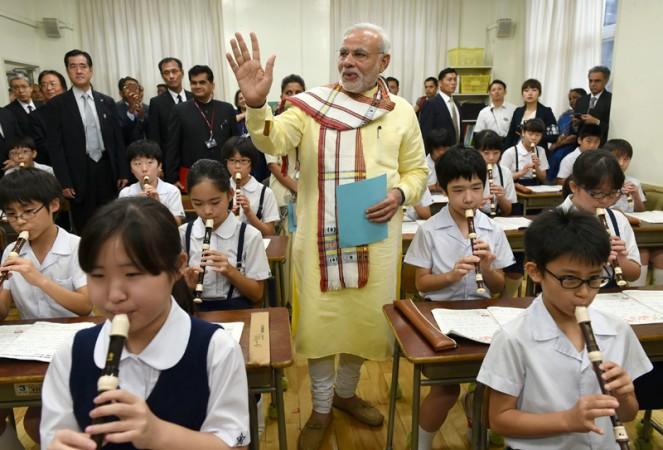
Prime Minister Narendra Modi admired the way moral education, modernity and discipline have been blended in the Japanese school system and could be imbibed in India, while speaking at the 136-year-old Taimei Elementary School in Tokyo on Monday.
Modi also understood the methods of evaluation and examination, how parents are kept involved with the child's education, and how the school syllabus is prepared.
Interacting with the Japanese Deputy Minister for Education, Culture, Sports, Science and Technology, Maekawa Kihai; and teachers from the Taimei Elementary School, the Prime Minister said the whole world accepts the 21st century as Asia century.
Asian countries must learn each other's languages and values, so that this century is more useful for humanity, he stated. He said India had introduced Japanese as a language option in schools, but there was shortage of teachers. He urged Japan to take up an initiative to introduce teaching of Japanese language online.
He said Indian languages could also be introduced in Japan, and such an exchange would positively impact this century.
Modi observed that on the same day in 1923, the Taimei Elementary School had been destroyed in an earthquake, but it had since been well-rebuilt. He said he was reminded of the 2001 Gujarat earthquake, and how 400 children had perished in a school in Anjar village, in that incident.
The Prime Minister also visited a music class, where children recited a song and presented a musical performance.
At a joint press conference with his Japanese counterpart Shinzo Abe, Modi said Japan will play an increasingly important role in India's economic transformation and development. Modi acknowleged Abe's intention to release ¥3.5 trillion or ₹2 crore, of public and private investment to India over the next five years.
"I am deeply grateful to him and the people of Japan. He (Shinzo Abe) has expressed strong support for my vision of India's development and has committed support in all areas of development," Modi said.















